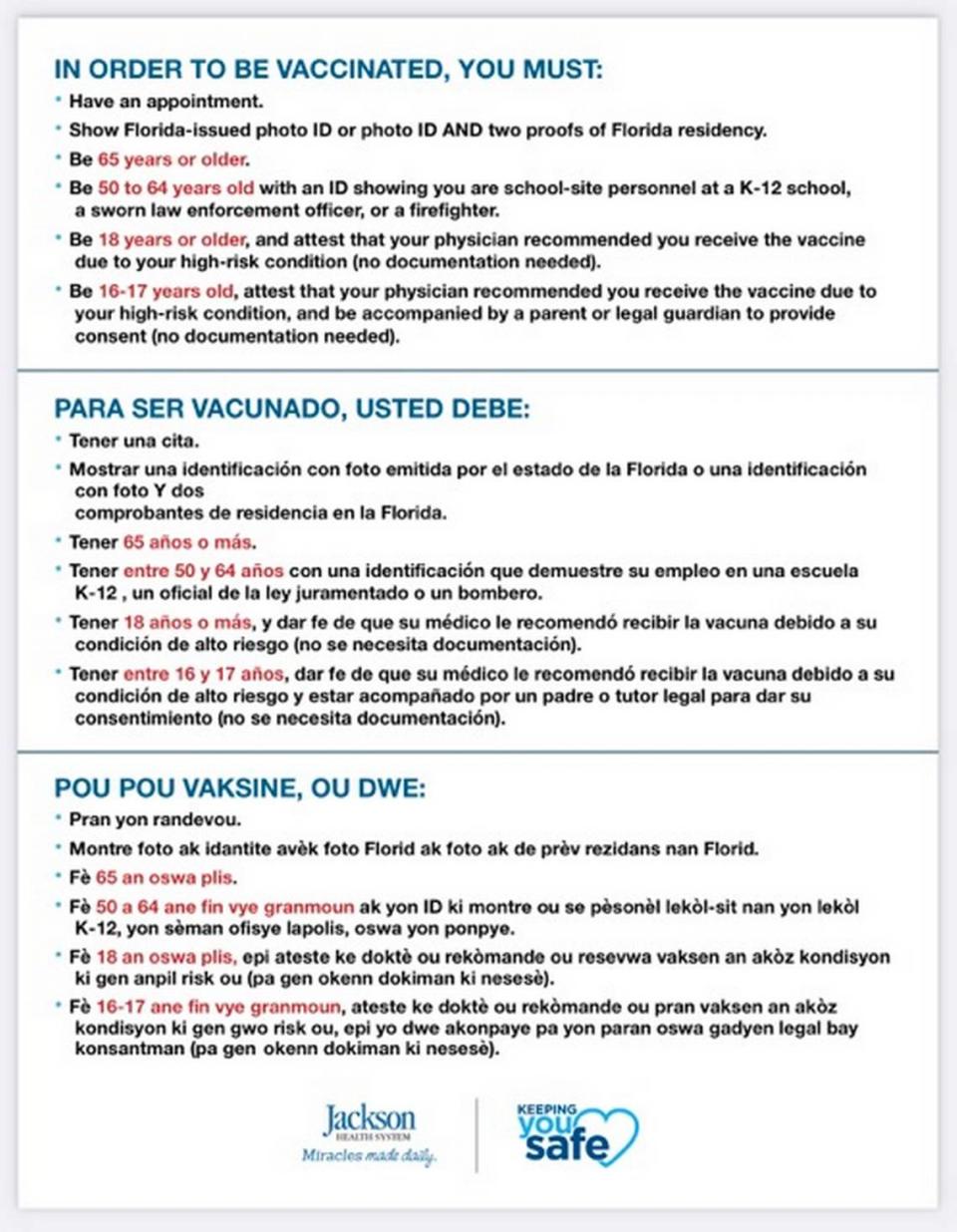Miami’s public hospital opens COVID vaccine appointments to at-risk people 16 and older
It’s about to be a lot easier to qualify for a COVID vaccine appointment at Miami’s public hospital system if you have a medical condition that could put you at risk for severe disease.
Jackson Health System expanded eligibility on Monday, dropping the minimum age to 16. The hospital first moved beyond the 13 medical conditions that previously qualified people for a vaccine last week, expanding to include people with diabetes, but it still required a doctor’s note and only applied to people over the age of 50.
Now, after not seeing a surge in sign-ups, Jackson has also eliminated most of the paperwork requirements. Anyone who has consulted a physician for any medical condition deemed to put them at risk could qualify for the vaccine.
The changes will go into effect with appointments made Monday evening for Tuesday. To check for available slots, visit jacksonhealth.org/keeping-you-safe/
The public hospital has vaccinated nearly 106,000 people and receives 9,360 first doses of the Pfizer-BioNTech COVID vaccine every week from the state. Jackson CEO Carlos Migoya said he doesn’t anticipate that weekly supply changing, but overall Miami-Dade County has seen an increase in supply, and a corresponding decrease in demand for appointments at Jackson.
“There are more vaccination sites available in Miami-Dade, and as that started happening we saw the vaccination for our sites slowing down,” Migoya said. “We felt it was important to go ahead and open it up again.”
But Jackson isn’t just expanding eligibility, it’s also eliminating much of the paperwork. It’s no longer requiring a signed physician’s notice and instead allowing people to “self certify” that their doctors told them they were at risk for severe COVID-19 due to a medical condition. Those between the age of 16 and 18 will require approval from a parent or guardian.
Though the U.S. Centers for Disease Control and Prevention has identified risk categories for medical conditions, Dr. Peter Paige, the hospital system’s chief clinical officer, said Jackson has decided to go beyond that and is simply asking patients to consult their doctor if they feel at risk. Then the doctor’s word would be good enough, he said.
“We’re giving the physicians a little bit more freedom,” Paige said.
The expansion from Jackson comes after some criticism of the doctor’s note policy, which public health experts said placed unnecessary barriers between people on the fringes of healthcare access and the vaccines.
Despite that, Jackson has still vaccinated the most Black people of any provider in South Florida by far. About 14% of Jackson’s vaccine appointments have gone to Black people, and about 50% of Black people in Miami-Dade who have received a COVID vaccine got it from Jackson. The Black communities represent about 16 percent of Miami-Dade’s population.
The hospital has attributed that success in vaccinating Black residents to its partnerships with community-based groups such as churches and nonprofits. It has scheduled about 30,000 appointments that way.
Policy change follows vaccine chaos at state-run sites
The expansion at Jackson comes after a week of vaccine chaos, where state-supported mega-sites were going unused in some areas of the state, including Miami-Dade.
That’s because the sites are restricted by Gov. Ron DeSantis’ executive order on who qualifies for a vaccine, but the order gives hospitals wider latitude to craft their own policies in vaccinating at-risk people.
On Monday, DeSantis said any Floridian 60 or older will be eligible for a coronavirus vaccination starting March 15 due to what he called “softening” demand among seniors 65 and up.
“The pharmacies have their windows to sign up. They’re not gone in 10 minutes like they were a month and a half ago,” DeSantis said. “We think that’s a good sign because we think that we’ve reached a critical mass of the senior population.”
With DeSantis’ latest order, Floridians eligible to get a coronavirus vaccine under state policy are: long-term care facility residents and staff; people aged 60 and older; front-line healthcare workers; and sworn law enforcement, K-12 employees and firefighters aged 50 or older.
About 60% of Miami-Dade’s 65-and-older population have received at least one dose of a COVID vaccine, slightly above the state average of 57%, according to University of South Florida epidemiologist Jason Salemi’s dashboard.
In Broward County, that number is at 62.5%, and Palm Beach County has reached 65.8%.
Broward Health, the public health system in Broward, is offering appointments to seniors 65 and older, healthcare workers, emergency medical service providers and people 18 and older with certain at-risk conditions. It did not respond Monday to a Herald request seeking whether it was lowering the age on its vaccination requirements.
Despite being tasked with vaccinating the medically vulnerable, Jackson has taken on the task of vaccinating seniors, too. More than 75% of Jackson’s vaccines have gone to people 65 and older, the primary demographic of focus so far in Florida’s vaccine rollout.

The new policy doesn’t require people to consult their physician to explicitly get permission for a vaccine, said Paige.
“A lot of these conditions are chronic,” he said. “ ... People know that certain conditions put them at high risk, and their doctors know. They probably already had those conversations.”
Paige added, “The point is, we’re getting to a point where we have more availability, and we want to spread those vaccinations out to a larger group.”
Herald/Times Tallahassee Bureau Reporter Kirby Wilson contributed to this report.

